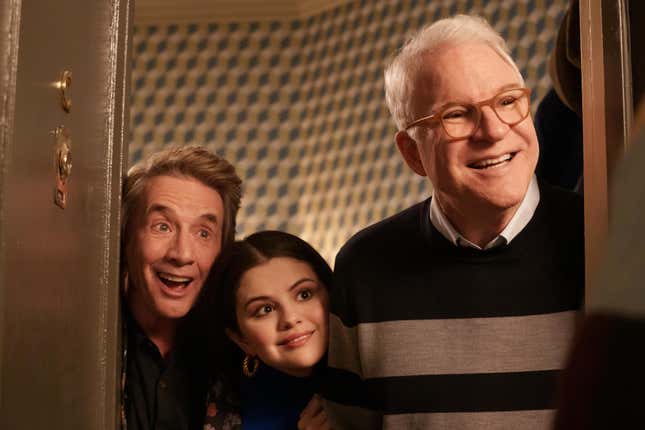I Hate Viral True Crime Culture, But I Love ‘Only Murders in the Building’
True crime content has made death and tragedy an industrial complex. Only Murders is refreshingly honest about this.
EntertainmentSaturday Night Social

Hulu’s Only Murders in the Building is back for a second season, after its first season last summer shattered all pre-conceived notions about whether 20-somethings and senior citizens can be friends. (I fully believe that Bernie Sanders and I would have a grand old time solving murders in our apartment building.)
Though only the first two episodes of this season have been released, I’m already quite enjoying it. The comedy-mystery picks up right where it left off, as Selena Gomez’s Mabel, Martin Short’s Oliver, and Steve Martin’s Charles—fresh off solving the murder of one of their neighbors, and podcasting about it every step of the way—suddenly find themselves framed for the murder of their cranky building president. In the chaos that ensues as the gang sets out to prove their innocence, Mabel is seduced by a charming artist played by Cara Delevingne; Charles tries to resolve his mysterious daddy issues; and Oliver makes a run at turning their podcast into a TV show with none other than Amy Schumer (who plays herself). A lot is going on, and I am living!!
I adore Only Murders, but my affection for this show bugs me a little, considering that its premise is rooted in the same viral, voyeuristic, true crime-obsessed culture that I despise in real life. For full transparency, growing up, I consumed my fair share of Dateline episodes with my mom and sisters. But—and I apologize in advance for sounding like I’m ancient—today’s youth aren’t indulging in rigorously reported deep dives hosted by veteran journalist Keith Morrison; they’re going down rabbit holes on TikTok and YouTube created by opportunistic, clout-chasing, unqualified influencers and podcasters who are racing to get ahead of stories about missing white girls as victims’ families grieve (and as missing women and girls of color go ignored).
When Gabby Petito disappeared last summer, TikTok, Twitter, YouTube and other social platforms were overrun with obsessive analysis and theories from true crime junkies, while Petito’s family mourned. The New York Times reported that the most prolific of these TikTokers, some of whom created dozens of videos at the height of the mystery surrounding Petito’s disappearance, got millions of views on their videos, and saw ballooning follower counts. None of these social media personalities are professionally trained investigators or journalists, yet they’d hijacked Petito’s story for their own gain, recklessly spreading what often turned out to be misinformation—a small price to pay, apparently, for more followers, sponsorships, and money. It was an illustration of a trend: In recent years, true crime podcasts and content have become a massively profitable, multi-million dollar industrial complex.
Which takes me back to Only Murders. In the midst of our true-crime-obsessed reality in which dead girls’ stories are reduced to get-rich-quick schemes on TikTok, I enjoy this show for its self-awareness. Oliver embodies the scheming, hustling nature of some true crime podcasters and creators (not in a positive light), but even he recognizes when he’s taking things too far. Mabel’s personal relationship to the first season’s murder victim allowed the show to accentuate the real-life emotional stakes of murder and death that social media citizen-sleuths often overlook. And the trio frequently jumps to conclusions and gets things wrong—like many true crime TikTokers and creators who rush to put out theories to maximize viewership.
Only Murders remains a story about murder that glorifies true crime podcasters—who should definitely leave solving these murders to professionals. But the show is also refreshingly honest about a burgeoning industry’s nosiness and penchant for exploitation, and the way it’s increasingly desensitizing spectators to the tragedy of these stories.
Do I wish I had more sophisticated taste in television? Yes. But if you haven’t noticed, these are the end times, and if I want to enjoy watching Selena Gomez strut around in ridiculous outfits and make out with Cara Delevingne, then I will, thank you very much.